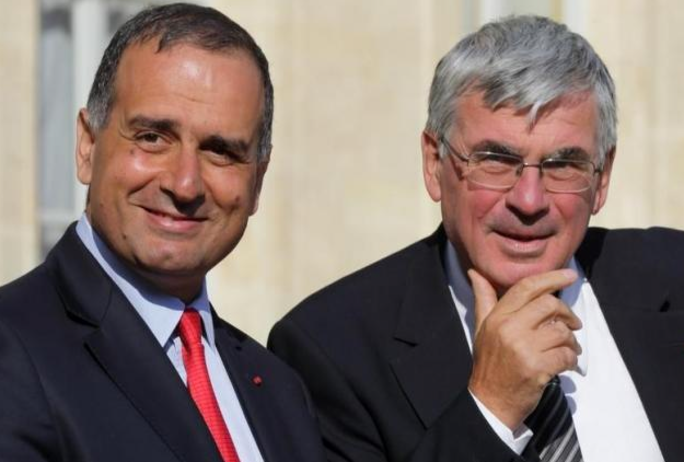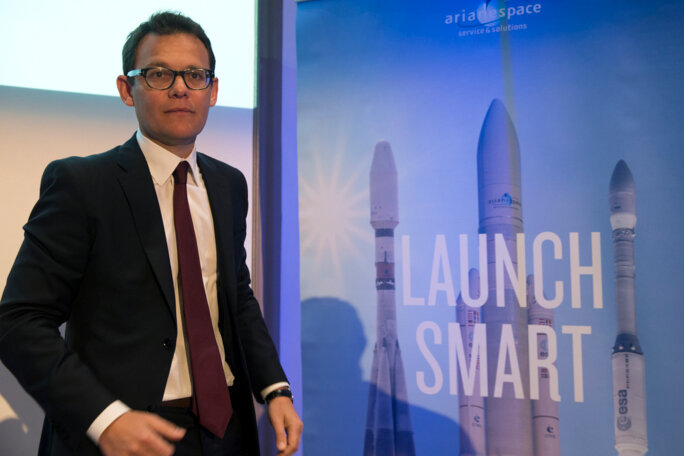At its weekly inter-ministerial meeting last Wednesday, the French government formally approved the transfer of shares held by France’s national space studies agency in rocket launch services provider Arianespace to a joint venture created last year by Airbus and aero-engine maker Safran, which will now have effective control of the European group.
Until now, the French National Centre for Space Research (Centre national de recherches spatiales) the CNES, was the largest single shareholder in Arianespace, with a 34.68% stake.
Created in 1980, the European commercial launcher is now, after becoming a world leader in the business and spearheading the European space dream, to be handed over to industrialists amid deep unease among many of its staff. The official announcement of the move is expected to be made at the Paris Air Show on Monday.

Enlargement : Illustration 1

“For years now Airbus has wanted to get its hands on Arianespace,” commented a longstanding member of staff at Arianespace, who asked for his name to be withheld. “It began by taking on a part of the industrial development of launchers in 2003. Certainly, things have to change. Our ways of working, defined in the 1980s, are becoming rigid, we need new flexibility. But does that come with a vertical integration that will see the absorption and disappearance of Arianespace? The state envisaged only the solution put forward by the industrialists. It is ready to hand over its shares, with no discussion, to a structure that is in the process of being formed, which hasn’t offered the slightest proof [of its competence], which doesn’t have a business plan.”
His concerns were echoed by a colleague, who has also worked for the company for many years, and who also asked his name to be withheld: “No alternative solution was studied. Each time we tried to put one forward, the management swept it aside, telling us a move forward was required.” The worries are shared by European minority shareholders (who are also suppliers) in Arianespace, reticent at the prospect of industrialists taking over the European space project and which are reluctant to fulfil their financial engagements in future space programmes. There are reports that the Paris-based intergovernmental European Space Agency is also unhappy with the privatisation.
“The [French government’s] decision to regroup space activities has been taken since December,” said a source with close knowledge of the move. Both French senior civil servants and the aerospace industry have lobbied for the regrouping, arguing that Arianespace could no longer remain an independent and disseminated structure.
The recently-departed French junior Minister of Higher Education and Research, Geneviève Fioraso, who as such was ultimately responsible for the CNES, France’s interest in Arianespace and space research in general, was in favour of the project (since her departure for health reasons in March, there is no longer a ministry specifically dedicated to research activity, after that role was absorbed by the education ministry).
But the key decision-maker in the affair is the French economy ministry, which broadly perceives the semi-public entity to be less competent than an all-industrial concern, despite the clear success of Arianespace over its 35-year history.
The keyword behind the project proposed by Airbus and Safran is competitiveness. Following its long dominance as the leading commercial launch service provider, sending hundreds of satellites into orbit and with more than a 50% share of worldwide launches, Arianespace faces new competition. This is primarily from the US, but also from China and India for whom an independent capacity in satellite launches, upon which depend the wide field of telecommunications, but also space research and astrophysics, is essential.
After years of relative retreat, the US space industry is in renewal, and Arianespace has a formidable competitor in Space X, an aerospace technology and transport company whose CEO is Elon Musk, also a cofounder of Tesla motors and PayPal. Space X (full name Space Exploration Technologies Corporation) has created a new launcher called Falcon 9, which can launch satellites for up to about 30% less than the price of its competitors.
In June 2014, the three staff representatives present on the board of Arianespace wrote a note to the company’s different administrators in which they underlined that the Ariane launcher was, taking into account the state support it receives, between two and three times “more competitive” than Space X. “It is therefore difficult for us to believe that the impending evolution [of the company] is of a nature to notably reduce the cost of an already powerful product,” they said.
Space X’s cheaper commercial launches are in effect subsidized by the scientific and institutional launches it carries out for NASA, and the issue might, in a different economic environment, have been brought before the World Trade Organization, which has previously heavily penalised Airbus for the state subsidies it received while competing with Boeing. But Arianespace has chosen instead to reduce its launch prices by 30%, essentially through restructuring.
New business pledges never offered to Arienespace
The restructuring is to be applied to the programme to build Ariane 6, a new launcher that will succeed Ariane 5 as of 2020. Both Airbus and Safran have for some while taken hold of the programme, despite opposition from space engineers and researchers. To reduce costs, they have argued for a launcher that would not carry payloads that are much above those launched at present. On several occasions, Arianespace engineering staff have warned their management that the strategy was ill-conceived, arguing that over the long-term the weight of satellites is steadily increasing.

Enlargement : Illustration 2

But the industrialists insist that the arrival of electric motors in place of traditional fuel-burning propulsion will allow for less weighty satellites, and the Ariane 6 programme was approved by the ministers of the European Space Agency member states on December 2nd 2014.
“Did we get it wrong?” surmised a longstanding member of staff at Arianespace who, like all the Arianespace staff who agreed to speak to Mediapart, asked for his name to be withheld. “We will only know much later, too late. This type of mistake is paid for in ten years’ time. But it could cost the whole of the European space industry.”
In what is something of a David and Goliath-like battle, the Arianespace staff who oppose the new strategy criticise their CEO and Chairman, Stéphane Israël, for showing little interest in the debate. “He never gave the impression of really wanting to defend Arianespace,” said one, whose name is withheld. “He straight away spoke of his ‘intellectual sympathy’ for the project and appeared to rally behind Airbus.”
Contacted by Mediapart, Stéphane Israël declined to offer any comment on the issue. “The group is unable to comment on a subject that concerns its shareholders,” said his PR officer.

Enlargement : Illustration 3

Ever since Israël was appointed to lead the consortium in 2013, after serving as chief-of-staff to then-industry minister Arnaud Montebourg, there have been tensions between him and Arianespace staff. “When he was at EADS [editor’s note: the European aerospace and defence consortium now renamed Airbus Group] he served [then-EADS CEO] Louis Gallois’ cabinet, but he’s not really a man of the field,” said an Arianespace employee. “As of the moment he arrived, he told us we were worth nil. He cut himself off from the company.”
Israël’s decision, shortly after taking up his post, to hire outside management consultants - Roland Berger Strategy Consultants and subsequently the Boston Consulting Group – was regarded as a slap in the face for the staff who interpreted the move as an attempt to shape the future of the consortium without taking their opinions into account.
Concerned about the evolution of the situation, staff unions hired an outside consultancy to carry out an audit of working conditions. The results were alarming. More than 40% of Arianespace employees said they were stressed, or very stressed, and for a multitude of reasons. These included excessive workloads, the feeling of being show a lack of respect, the company’s working organisation, and management practices. The audit reported a “degraded” social atmosphere due to “the perception of a lack of exemplarity on the part of directors”.
A previous audit of working conditions by American law firm Lathma & Watkins, in February 2011, drew attention to the excessive workload of Arianespace employees, with some putting in well over 70 hours per week. But whereas there was then a largely enthusiastic atmosphere behind a collective project, the current management approach has changed all that.
In a rare event, on December 2nd 2014, Arianespace staff at its headquarters at Courcouronnes, near Evry, south of Paris, and at the launch base in Kourou, French Guiana, went on strike to denounce what they described as worsening working conditions, increasing workload pressure and a lack of clarity about their professional future. “Since the change in the governance of our company, the workforce no longer feels it is defended,” read a statement by one trades union, the CGC, which represents highly-qualified and managerial employees.
There are persistent rumours among Arianespace staff that about one hundred jobs are to be axed, representing about a third of the workforce. The consortium’s PR office says it has no knowledge of such a figure.
Mediapart understands that the French government has never asked for precise guarantees for the future of the workforce except, a pledge by Airbus Safran Launchers that it will not close the Arianespace headquarters close to Evry, the local political base of Prime Minister Manuel Valls.
According to a report in French financial daily Les Échos, the French agency in charge of managing state holdings in companies (l’agence de participations de l’État), the APE, and the economy ministry have agreed to sell to Airbus Safran Launchers the 34.68% stake held by the French National Centre for Space Research (CNES) for a price of between 100-200 million euros.
Neither the French economy and finance ministry, nor the APE answered our request for an interview.
“To transfer [shares] does not mean to give them away,” said Jean-Yves Le Gall, president of the CNES, and a former head of Arianespace, during a recent board meeting. Other minority shareholders, firms from nine other European countries which have an active role in the Arianespace project, have also expressed concern over a reduction in the values of their stakes.
Contacted by Mediapart, the CNES refused to comment on the issue.
Importantly, Arianespace has assets, a commercial base and has a spectacular record of success, even if its financial results are poor, notably because of risk previsions and insurance costs.
But the price could be lower if, as is rumoured within Arianespace, the government allows Airbus Safran Launchers to use the Kourou space station free of rent and maintenance costs – which until now Arianespace has had to pay – representing a yearly saving of 150 million euros.
Airbus denies the rumour. “It would be a good idea,” commented Airbus Group chief strategy officer Marwan Lahoud, who serves as the company’s negotiator with the French government. “But no, we will continue to pay for the use of Kourou,” he insisted.
Airbus and Safran have obtained a pledge that, in exchange for their participation in the development of the Ariane 6 rocket programme, Arianespace will be chosen for the launch of institutional satellite projects financed by the European Space Agency and other public agencies. Airbus Safran Launchers has asked for a guarantee of five such launches per year. Previously, Arianespace, during the 35 years since its creation, was never given any state guarantees of business.
All of which raises the question of just why the private sector has been handed the reins when the state must take on a far greater part of the commercial risks than in the past with Arianespace. Importantly, Airbus Group and Safran are hardly lacking in funds. In May, the former launched a new share buyback of 10% of its capital, which at the current price of its shares represents 4.7 billion euros. The group had already spent about 5 billion euros in a share buyback two years ago, during a reorganisation of its shareholding structure.
-------------------------
- The French version of this article can be found here.
English version by Graham Tearse


